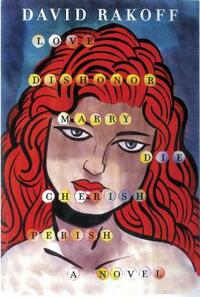You need to sign in or sign up before continuing.
Take a photo of a barcode or cover
I’ve had this book for a few years and hadn’t read it because I figured it probably contained the meaning of life and a key to its secrets or whatever (because David Rakoff is my favourite writer and this is his first ‘novel’ but it’s also in verse and he wrote it while he was dying). It does.
An elegy for himself, an ode to the capriciousness of life infused with the profound poignancy that David Rakoff died soon after he completed this work. In fact, he had cancer and knew that he was going to die while he was writing this. Which he did at the age of 47.
This is a wonderfully unique book. A poem-novel. Admittedly, the rhyming couplet is not the most elevated form of poetry. It has an inescapable relationship to the limerick. But Rakoff manages to use it in a way that transcends the limitation of that scheme. He embraces the innate "low" humor of the rhyming couplet to provide a sense of humor to the saddest of stories. It is without a doubt a heartfelt expression of his own spirit, finding the humor in tragedy.
He manages quite inventive and unexpected rhymes, and while there is an occasional awkwardness in the meter, it is rare, and for the most part, so smooth you barely notice the cadence. He wisely and frequently breaks the repetitive meter found in stereotypical rhyming couplets to produce something of great sophistication.
And beyond the language, the characters presented are masterfully real and sensitively rendered. One might quibble that this isn't quite a novel, rather a series of interconnected short stories. But so what? You follow a character for a chapter and then follow another one for a chapter whom the previous had encountered in some fashion and then another that the previous had encountered and so on. It is rather a human chain of relationship that while tenuous at best (sounds like real life, no?) is all we have in this world. There is modest intertwining of the stories, but primarily they are individual journeys. And the consistent theme seems to be that life always takes you somewhere you didn't expect or plan. You just never know what will happen so you might as well live your life as fully as you can and don't let it pass you by.
So, as Thoreau suggested: live deeply and suck out all the marrow of life. For tomorrow, you might have a brain tumor.
This is a wonderfully unique book. A poem-novel. Admittedly, the rhyming couplet is not the most elevated form of poetry. It has an inescapable relationship to the limerick. But Rakoff manages to use it in a way that transcends the limitation of that scheme. He embraces the innate "low" humor of the rhyming couplet to provide a sense of humor to the saddest of stories. It is without a doubt a heartfelt expression of his own spirit, finding the humor in tragedy.
He manages quite inventive and unexpected rhymes, and while there is an occasional awkwardness in the meter, it is rare, and for the most part, so smooth you barely notice the cadence. He wisely and frequently breaks the repetitive meter found in stereotypical rhyming couplets to produce something of great sophistication.
And beyond the language, the characters presented are masterfully real and sensitively rendered. One might quibble that this isn't quite a novel, rather a series of interconnected short stories. But so what? You follow a character for a chapter and then follow another one for a chapter whom the previous had encountered in some fashion and then another that the previous had encountered and so on. It is rather a human chain of relationship that while tenuous at best (sounds like real life, no?) is all we have in this world. There is modest intertwining of the stories, but primarily they are individual journeys. And the consistent theme seems to be that life always takes you somewhere you didn't expect or plan. You just never know what will happen so you might as well live your life as fully as you can and don't let it pass you by.
So, as Thoreau suggested: live deeply and suck out all the marrow of life. For tomorrow, you might have a brain tumor.
kept being reminded that mr. rakoff wa sdying at the time he wrote this one. this is because i stepped into this work expecting something comedic. this is not the case. rather tragic. diifficult for me to follow at times.
I found this absolutely delightful. The rhymes aren't just a gimmick - they are such a rich story-telling technique that makes the stories so layered, with every word a deliberate, specific choice. It's a keeper, one I'll read again, most definitely.
If you aren't familiar with David Rakoff, give yourself a treat and go listen to some of his stories.
Maybe the only person qualified to write a book like this is one that is facing his own mortality. And it is heartbreaking to realize it's David's voice in my head that I am hearing read it. (but it was lovely to have him "read" it to me.)
I recommend this book to everyone, but please. Do yourself (and this book) a favor and find two hours to spend alone with the book. Or read it to someone you can trust. It doesn't take long to read. I think it will take a lifetime to put down.
(An essay on David, this book, and some of his final performances.)
Maybe the only person qualified to write a book like this is one that is facing his own mortality. And it is heartbreaking to realize it's David's voice in my head that I am hearing read it. (but it was lovely to have him "read" it to me.)
I recommend this book to everyone, but please. Do yourself (and this book) a favor and find two hours to spend alone with the book. Or read it to someone you can trust. It doesn't take long to read. I think it will take a lifetime to put down.
(An essay on David, this book, and some of his final performances.)
At first, I was a little worried that rhyme might constrain the writing here, I was incredibly wrong. I found it poignant and touching and beautiful. Characters are interwoven in a way that seems real and not trite. A really, really, lovely read.
While the fictitious stories are interesting, the entire "novel" is written in rhyming poetry. I hate contemporary rhyming poetry. I'm not saying this is a bad book; it's just not for me.
reflective
medium-paced
I've enjoyed poem-novels before...well, one. 'Sharp Teeth' was exceptionally entertaining and rises above what (let's be honest) is a gimmick.
That this was Rakoff's last work gave me pause, but I just couldn't get into it. The rhymes were clever and the dark content of the stories was a deliberate contrast to the sing-song of the verse. That does not excuse the fact that it was still sing-song verse. I can take that from some poets in certain meters, but this was too much for me. It was like the sound of grit between two ceramic plates.
That this was Rakoff's last work gave me pause, but I just couldn't get into it. The rhymes were clever and the dark content of the stories was a deliberate contrast to the sing-song of the verse. That does not excuse the fact that it was still sing-song verse. I can take that from some poets in certain meters, but this was too much for me. It was like the sound of grit between two ceramic plates.
What a strange little book. It's tiny, you can read it in one short sitting. It's a novel told in verse. It seems quite whimsical with it's rhyming and characters sketched as cartoon figures, but the topics are quite adult and even racey. It's written in the lilting, light cadence of "there once was a man from Nantucket..." but it's some serious s!*! His humor is biting and dark which I loved. This book is different from anything you've read, guaranteed. Such a loss, to lose such a talented man so young.







